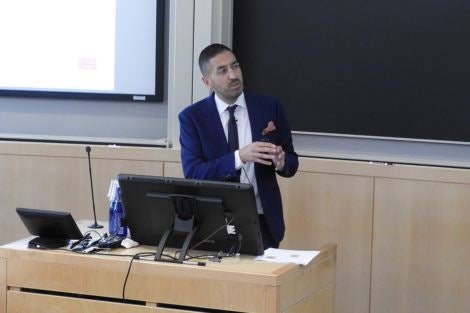September 17, 2019—Sandro Galea, dean and Robert A. Knox Professor at Boston University School of Public Health, outlined for a Harvard T.H. Chan School of Public Health audience what he sees as the current state of the epidemiology field, and challenged students in the audience to contribute to building an “epidemiology that matters.” The talk, sponsored by the Department of Epidemiology, was held September 11, 2019.
Galea began his talk by noting the anniversary of the terrorist attacks on the U.S. He is a co-author of several studies in the aftermath of the attacks that looked at the mental health of New Yorkers, particularly rescue workers. Documenting the causes and distribution of ill health, he said, “is a function at the heart of what we do.”
However, Galea argued, the field’s emphasis on finding the causes and distribution of diseases can come at the expense of rigorous engagement with another of epidemiology’s core functions: identifying ways to intervene to improve the health of populations.
To help counter this trend, he offered seven steps for conducting an epidemiologic study “of consequence” that starts and ends with populations—defining the population of interest and assessing whether the results matter to other populations.
Although Galea is often considered a social epidemiologist, he rejected the term. All epidemiologists should be concerned with a wide breadth of exposures that can affect health, such as racial segregation and income inequality, he said. “We can’t afford not to pay attention to the broader forces that matter.”
The field, he said, can be too focused on a narrow set of ill health conditions and slow to embrace non-traditional study methods, and new sources of data such as social media. Another challenge, he said, is that the field needs to become much more diverse.
He encouraged students to see the field’s challenges as opportunities that they can fix. And while epidemiology is not inherently a field for advocacy, epidemiologists are also citizens, he said. “I think citizens have a responsibility to be advocates if they know something that other citizens do not.”
Photo: Coppelia Liebenthal
